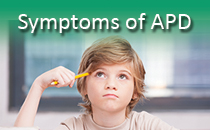 Understanding spoken language involves not only the ear’s ability to detect sounds, but also the brain’s capacity to recognize, interpret, and use the acoustic information in our surroundings. Auditory Processing Disorder (APD), formerly known as central auditory processing disorder (CAPD), is a condition where the brain struggles to convert sounds into usable information accurately and efficiently, even though hearing sensitivity is typically normal. Individuals with Auditory Processing Disorder have a neurological defect in the pathways from the auditory (hearing) nerve to the higher auditory pathways in the brain, leading to distortion and delay in auditory signal transmission. This inaccurate coding of sound leads to poor ability to filter and process sounds and words, resulting in difficulties in processing and interpreting what they hear, often mimicking a hearing loss.
Understanding spoken language involves not only the ear’s ability to detect sounds, but also the brain’s capacity to recognize, interpret, and use the acoustic information in our surroundings. Auditory Processing Disorder (APD), formerly known as central auditory processing disorder (CAPD), is a condition where the brain struggles to convert sounds into usable information accurately and efficiently, even though hearing sensitivity is typically normal. Individuals with Auditory Processing Disorder have a neurological defect in the pathways from the auditory (hearing) nerve to the higher auditory pathways in the brain, leading to distortion and delay in auditory signal transmission. This inaccurate coding of sound leads to poor ability to filter and process sounds and words, resulting in difficulties in processing and interpreting what they hear, often mimicking a hearing loss.
How Does APD Affect Listening?
Most individuals with Auditory Processing Disorder pass a hearing test and have normal intelligence. However, since the brain receives sounds incorrectly, they may struggle to recognize subtle differences between sounds in words (duh and guh for example) and experience challenges using those sounds for speech and language.
Individuals with Auditory Processing Disorder often have trouble screening out background noise, making it challenging to understand speech in noisy environments. Even surrounding sounds that most people can easily ignore (such as air conditioners, coughing, pencils tapping) may cover up the voices they are trying to hear, and noisy environments such as gymnasiums can be overwhelming. It’s like listening to mumbled speech or a radio station with static or other stations interfering with the reception. Furthermore, Children with APD have to exert significant effort to comprehend speech, which can lead to forgetting parts of what they hear.
There are various types, areas, or categories of auditory processing deficits that can contribute to Auditory Processing Disorder, and symptoms vary widely between individuals. Auditory processing evaluations are commonly conducted on school-age children, and testing for early signs of weaknesses can begin as young as age 3. Many adults also undergo these assessments.
Key Symptoms of APD
APD is more than just a hearing problem. It is a brain-based hearing impairment that affects how sounds are understood. Since there are different types of APD, symptoms will vary from person to person. Individuals with APD commonly experience difficulties with:
- Understanding speech in noisy environments
- Frequently asking for repetition
- Mishearing auditory information
- Distinguishing between similar sounds (i.e. “bat” vs “pat”)
- Following multiple-step or lengthy oral directions
- Struggling to follow conversations
- Remembering auditory information (auditory memory)
- Understanding rapid speech or complex language
- Maintaining attention when listening to verbal information
Explore our APD Symptoms page for more detailed information including the educational impact of auditory processing disorder and APD Symptoms by Age Group.
Comprehensive Testing Matters
Due to the complexity of APD, our approach to evaluations is comprehensive. We do not adhere to a single model but prioritize quality and employ a complete range of auditory processing tests to identify the underlying causes of struggles. We understand that similar symptoms may arise from weaknesses in different underlying processing skills. Therefore, we take the necessary time to fully comprehend each individual’s strengths, challenges, and potential areas for improvement. Learn more about our APD evaluations here.




